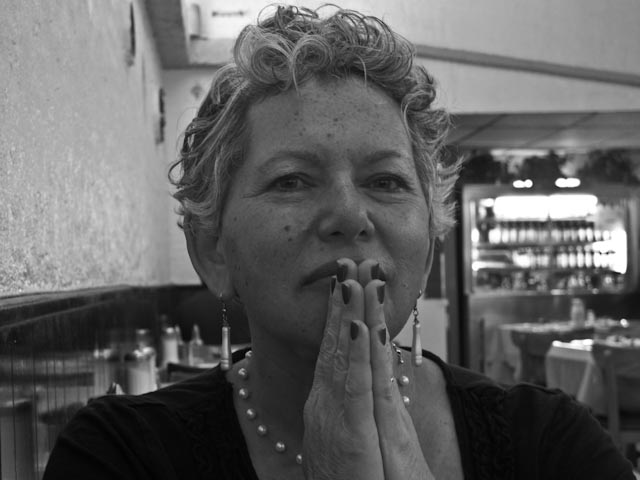Growing up, my neuropsychologist mom taught me that what people said and the thoughts behind their words were often two very different things. As a kid, sometimes this was scary, feeling everyone had a secret interior life. Yet, as I got older I, like her, became fascinated with figuring people out, in essence listening deeper than what they were saying to hear more intimate stories. Mom was patient, boundlessly kind, her generosity and warm hazel eyes drew people out of their shells sometimes to reveal pain and sadness, sometimes to show secret beauty. Mom had the gift to heal by listening, yet sometimes I wondered who listened to her. Throughout my life, I wanted to be the one to draw her out, fold her fears and secret sadness in my own blanket of understanding. I knew my mom had moved around a lot as a child, her father a chaplain in the military, Mom was born in Ft. Riley, Kansas, spent her first year in France, then was shuttled between suburban towns where she felt more out of place because of her name Alizah, New York’s Lower East Side streets and finally the tree lined lanes of Great Neck, Long Island. Mom bore all this with grace and understanding, raising my younger brother and I with a patience often in contrast to our artist father’s wild outbursts—both creative and sometimes scary. Recently, I finally sat down with my mother to switch roles, to talk with her about her geographically checkered youth, her grief stricken grandmother—in some ways her first therapy patient, her need to save damaged people, deep human connections, fear and how we can get past it.
ROYAL YOUNG: You moved around a lot as a kid. Was it ever depressing or hard to form lasting connections or difficult to leave friends behind?
ALIZAH BROZGOLD: It was hard, especially when I was younger. In elementary school, the first big move I remember well, when we moved from Cedar Grove, New Jersey to the Lower East Side.
YOUNG: How old were you?
BROZGOLD: I was eight, turning nine. That was really hard. I remember not wanting to move and being upset about it. The other thing is that I changed schools a lot, so even within one location, I could have been at two or three different schools.
YOUNG: What necessitated all these moves?
BROZGOLD: Primarily career choices of my parents. My dad was a Rabbi and would move to a different congregation. My mom was working as a school psychologist then. Also, they were both getting their doctorates in the city. As well as being near their parents, on the Lower East Side. Initially only my mother’s parents were on the Lower East Side and my father’s parents were in Philadelphia, but then my dad’s dad died when I was about ten years-old, his mother moved to the Lower East Side, a few blocks away from where we were living.
YOUNG: How did being close to both sets of grandparents make you feel?
BROZGOLD: It was definitely grounding for me in a deeper way. Having two grandmothers who loved me very much and cared for me very much. My younger brother and I would always have dinner once a week with my mother’s mother. My father’s mother was a whole other relationship and looking back, it was formative even in my becoming a psychologist later. I was probably in fifth grade when she moved a few blocks away, her husband had just died, she had made a big move and she was in her 60’s. She was really disoriented, upset and displaced physically and emotionally. My parents would just send me over there on my own, like “Go visit Babbi.” [laughs] She was pretty nuts. I just remember her talking and talking, a kind of monologue about how upset she was. It was pretty inappropriate, not the kind of thing a grandmother would be telling a grandchild of ten years-old typically. It had a therapy-like feel to it. I was listening to her emoting and mourning, trying to figure out how she felt about I this huge change in her life. Because I was overwhelmed and really had no idea what to say, I just listened. I think there was something about that that got comfortable for me in a way that might have paved my way a little bit.
YOUNG: When did you become interested in psychology in a real way? When did you become interested in the relationships between people and what motivates them?
BROZGOLD: I think I always was. There was always something that attracted me to peers that were kind of eccentric or a little strange. I was curious about them. I wanted to understand them. I felt somehow I could help them.
YOUNG: Do you feel you ended up choosing friendships with damaged people because of your need to save them?
BROZGOLD: Early on in my life, yes.
YOUNG: How did that work out?
BROZGOLD: [laughs] Well, let’s put it this way, many of them are no longer my friends. Of course, we’re all damaged or vulnerable in some way and we all have our problems. But when I was an adolescent I was drawn to some of these troubled people, my motives were about being a savior. Now, my relationship with my friends who are human and have their human struggles is more mutual. I don’t see myself as out to save them.
YOUNG: Was there ever a really disturbing place those early motivations took you?
BROZGOLD: Not really. Though what I will say is any truly lasting, emotionally intimate relationship takes you out of your comfort zones. Being a parent, being a wife, being a close friend, if it’s going to be an authentic, meaningful and deep connection with another person, it inevitably is going to take you out of your comfort zone.
YOUNG: Would you say a relationship where that doesn’t happen is not a true relationship?
BROZGOLD: I think if you’re going to grow as a person and in a relationship, if you don’t get to a difficult place, it’s not very deep.
YOUNG: Why is it that difficult equals good?
BROZGOLD: Because when you get through difficult, and you’re alive and intact, it reaffirms you can go through something hard together, you can bare fears and anxieties that are scary and the person will still love you, that you can still love them. That’s presupposing you get through. Some people don’t.
YOUNG: What do you think the most common reason people don’t is?
BROZGOLD: Probably fear. Fear of change. When you get involved with someone and you’ve had only very troubling, abandoning or rejecting relationships in the past with people you’re close to and then you’re suddenly involved with someone who’s not going to abandon you, reject you or let you down. Even though there are parts of that which can be very gratifying, exciting and wonderful, another part calls into question your whole reality.
YOUNG: I myself have fallen victim to that, but I really strongly feel the importance of being attracted to good, love, generosity, joy and how important it is to fight through the impulse to be drawn to negativity. What are some tools you would suggest in the battle against fear?
BROZGOLD: The first one is recognizing that it’s so human and normal and there shouldn’t be any shame involved in it. Communication is really important, being able to talk with someone about the fears you have and asking “Is this real?” Just realizing that it’s not you wake up one morning and you’re free of fear. We don’t suddenly go from the light side to the dark, there’s a favorite Ethiopian proverb of mine “Slowly, slowly, even an egg begins to walk.”


at 00:11
How beautiful. I appreciate the wisdom of my wonderful and dearest friend.